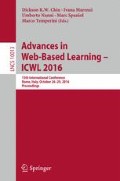Abstract
Successful teaching and learning in higher education is currently associated with the use of new information and communication technologies. Learning/learner-centered practice and research have put increased emphasis on active, self-regulated and, lately, social learning. Social constructivist theoreticians and practitioners have investigated how successful learning is supported and stimulated by discussing, sharing, collaborating and contributing knowledge in Web 2.0/social media environments where peers and teachers are just one click away. In 2015, the authors investigated students’ perceptions of extending the activity on Facebook, revealing that students active on Facebook perform better on the learning management platform, having superior learning outcomes. Consequently, a Facebook closed group was attached to the language learning course as a space of communication and informal learning where students may actively contribute and interact with their peers and teacher. The present research aims to find out whether this space allows for active and interactive learning, while triggering better engagement with course content. Students’ reported motivation, frequency and ease of use of their Facebook activity are compared with their real activity in the group. Data are collected by means of the questionnaire validated in the previous study and Facebook data. The results are expected to contribute to existing empirical data on the benefits and challenges of using social media for educational purposes, for active learning beyond the classroom and suggest possible changes in pedagogical design to ensure higher levels of engagement and correlation with academic success.
Access this chapter
Tax calculation will be finalised at checkout
Purchases are for personal use only
Notes
References
Warschauer, M., Meskill, C.: Technology and second language teaching. In: Handbook of Undergraduate Second Language Education, pp. 303–318 (2000)
Butler-Pascoe, M.E.: The history of CALL: the intertwining paths of technology. In: Medical Applications of Intelligent Data Analysis: Research Advancements, p. 16 (2012)
Lund, A.: Teachers as agents of change: ICTs and a reconsideration of teacher expertise. Anal. Surv., 27 (2004)
Lomicka, L., Lord, G.: Social networking and language learning. In: The Routledge Handbook of Language Learning and Technology, p. 255 (2016)
Stantchev, V., Colomo-Palacios, R., Soto-Acosta, P., Misra, S.: Learning management systems and cloud file hosting services: a study on students’ acceptance. Comput. Hum. Behav. 31, 612–619 (2014)
Prince, Michael: Does active learning work? A review of the research. J. Eng. Educ. 93(3), 223–231 (2004)
van Hout-Wolters, B., Simons, R.J., Volet, S.: Active learning: self-directed learning and independent work. In: Simons, R.J., van der Linden, J., Duffy, T. (eds.) New Learning, pp. 21–36. Springer, Netherlands (2000)
Williams, Jo, Chinn, S.J.: Using Web 2.0 to support the active learning experience. J. Inf. Syst. Educ. 20(2), 165 (2009)
Cervera, A.S., Ramos, C.R., Arnó i Macià, E.: Students’ profile as autonomous learners in an Internet-based EAP course. Ibérica: Revista de la Asociación Europea de Lenguas para Fines Específicos (AELFE) 9, 53–78 (2005)
Arnó Macià, E.: The role of technology in teaching languages for specific purposes courses. Mod. Lang. J. 96(Focus Issue) (2012)
Lomicka, L., Lord, G.: Social networking and language learning. In: The Routledge Handbook of Language Learning and Technology, p. 255 (2016)
Veletsianos, G.: Emerging Technologies in Distance Education. Athabasca University Press, Edmonton (2010)
Facebrands. Date demografice Facebook Romania. www.facebrands.ro/demografice.html
Mihai, I.: Studiu E-research. Comportamente de utilizare a retelelor sociale din Romania (2012). www.iqads.ro/articol/22529/studiu-eresearch-comportamente-de-utilizare-a-retelelor-sociale-din-romania
Stanca, L., Felea, C.: Students’ perception and expectations of educational uses of wikis and facebook for learning english for academic purposes - a pilot study. In: Conference Proceedings of eLearning and Software for Education (eLSE), vol. 3, pp. 422–429. Universitatea Nationala de Aparare Carol I (2015)
Mazman, S.G., Usluel, Y.K.: Modeling educational usage of Facebook. Comput. Educ. 55(2), 444–453 (2010)
Wise, L.Z., Skues, J., Williams, B.: Facebook in higher education promotes social but not academic engagement. In: Changing Demands, Changing Directions. Proceedings Ascilite Hobart, pp. 1332–1342 (2011)
Junco, R.: The relationship between frequency of Facebook use, participation in Facebook activities, and student engagement. Comput. Educ. 58(1), 162–171 (2012)
McBride, K.: Social-networking sites in foreign language classes: opportunities for re-creation. In: The Next Generation: Social Networking and Online Collaboration in Foreign Language Learning, pp. 35–58 (2009)
Junco, R.: Too much face and not enough books: The relationship between multiple indices of Facebook use and academic performance. Comput. Hum. Behav. 28(1), 187–198 (2012)
Author information
Authors and Affiliations
Corresponding author
Editor information
Editors and Affiliations
Rights and permissions
Copyright information
© 2016 Springer International Publishing AG
About this paper
Cite this paper
Stanca, L., Felea, C. (2016). Facebook Groups in Teaching English for Specific (Academic) Purposes - Active Learning Beyond the Classroom. In: Chiu, D., Marenzi, I., Nanni, U., Spaniol, M., Temperini, M. (eds) Advances in Web-Based Learning – ICWL 2016. ICWL 2016. Lecture Notes in Computer Science(), vol 10013. Springer, Cham. https://doi.org/10.1007/978-3-319-47440-3_28
Download citation
DOI: https://doi.org/10.1007/978-3-319-47440-3_28
Published:
Publisher Name: Springer, Cham
Print ISBN: 978-3-319-47439-7
Online ISBN: 978-3-319-47440-3
eBook Packages: Computer ScienceComputer Science (R0)

